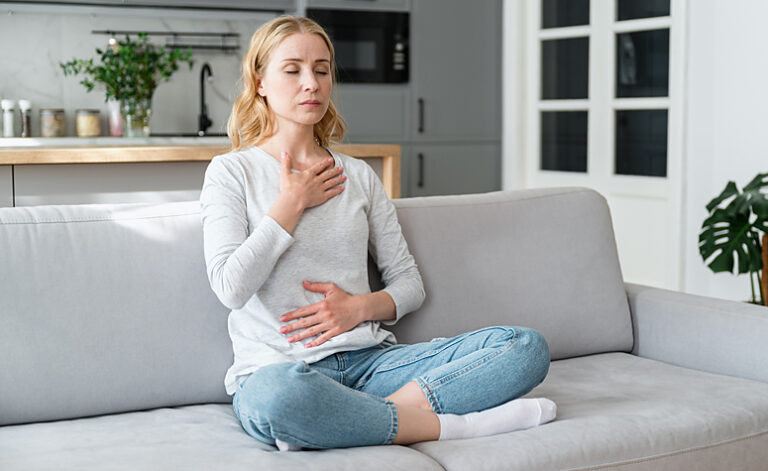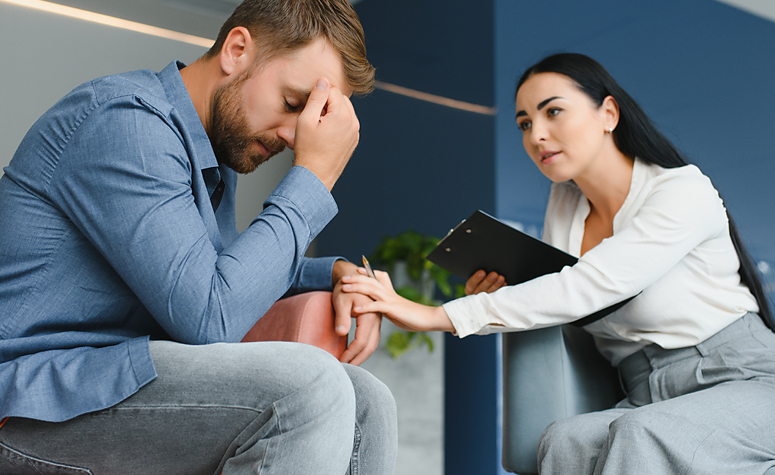Anxiety Attack Treatment
Picture this: you’re in a cozy cafe with friends, laughing out loud, comfortable in your seat, sipping your drink when all of a sudden, something happens. Your chest tightens, you feel your throat close up like there’s a huge lump of rock lodged in there preventing you from speaking a single word, and you hear a mind-numbing ringing sound in your ears. You forget where you are, and it becomes increasingly hard to breathe for no reason.
Anxiety attacks are just like that; they’re like uninvited guests barreling through the door of your unconscious mind with the slightest trigger or no warning at all.
Truthfully, it’s never easy to live with anxiety, but it doesn’t mean that treating it is impossible either. Read on to discover how anxiety takes shape and how it can be treated through different approaches.

What are Anxiety Attacks
Anxiety attacks can happen suddenly because of a certain trigger or even without any prior reason. People suffering from it can experience chest pains, shortness of breath, nausea, muscle spasms, and feeling dizzy or lightheaded.
Attacks can differ from person to person and the intensity of the symptoms also vary. It also doesn’t matter if you’re alone or with a lot of people. Some people even mistake anxiety attacks as having a heart attack because of the intense chest pains and palpitations. As a result, some of them call an ambulance to seek professional help.
Anxiety attacks also manifest in many different ways, not just physical. Below you’ll find a list of the physical, behavioural, and psychological symptoms to tell when an anxiety attack is happening.
Physical symptoms of anxiety attacks
Hyperventilating
Shortness of breath
Muscle spasms
Body tremors
Excessive sweating
Chest pains and palpitations
Dizziness or lightheadedness
Feeling your throat close up or choking
Nausea and stomach discomfort
Feeling cold and then hot flushes
Feeling numb or a tingling sensation (on the toes, fingers, or lips)
Fluctuating appetite (increased or poor eating habits)
Psychological symptoms of anxiety attacks
Stress
Depression
Paranoia
Low self-esteem
Feeling as if you’ve lost control
Brain fog and struggling to focus
Feeling detached from your environment
Feeling overwhelmed and prone to emotional outbursts
Intense belief that you’re dying from a heart attack
Feelings of hopelessness and frustration
Constantly worrying about the next anxiety attack
Self medicating through alcohol and drugs
Behavioural/social symptoms of anxiety attacks
Isolating from friends, family, and other loved ones
Avoiding social gatherings and constantly being at home only
Not being able to perform well at school or work
Inability to manage daily tasks effectively
Visiting the ER or ambulance frequently due to anxiety attacks

What lies behind us and what lies before us are
tiny matters compared to what lies within us
What Causes Anxiety Attacks
There is no sole reason why people experience anxiety attacks, however most people find themselves experiencing the same symptoms in different degrees.
Work or school pressure
Financial pressure
Family or relationships problems
divorce, separation, or bereavement
Concerns about parenthood or being a caregiver
Worry about the environment or climate change
Changing life situations, such as moving house or changing jobs
Reduced mobility or physical function
Loss of mental function, for example, short-term memory
Having a diagnosis of a chronic health condition
It may also be linked to other health conditions such as:
A phobia
- Post-traumatic stress disorder (PTSD)
Genetic factors
Major stressful events
A history of drug or alcohol abuse
Excessive caffeine use
The use of some medications
A recent or past traumatic experience
Anxiety is a challenging mental health disorder to live with and it can even drive anyone into isolation. The uncertainty of not knowing when the next anxiety attack will be can be deeply upsetting. Oftentimes, people feel trapped and feel as if they are losing control of their own lives.
As people experience anxiety attacks differently, they don’t just require a one-size-fits-all treatment, but a tailored treatment plan that considers all the unique factors that come into play. When anxiety is treated, people can finally feel safe and no longer have to always operate in fear.
Everybody deserves to access treatment for anxiety attacks no matter the age or background they have, after all.
What are the Treatments for Anxiety Attacks
Most treatments for anxiety attacks can be done in an outpatient or inpatient setup and it’s highly dependent on the severity of the patient’s anxiety. There are different benefits to the two arrangements as outpatient can help people go back to their day-to-day life and manage their own symptoms through therapy and medication.
When it comes to inpatient treatment, people are taken in a residential facility where they can treat the worst symptoms of the anxiety attacks and help people slowly acclimate back to their lives with a calmer nervous system and away from potential triggers.
A tailored treatment plan usually consists of therapy where the patient collaborates with a therapist to uncover the underlying reasons behind their condition. The goal is to understand the root causes first and then develop coping strategies or ways of thinking that challenge these dysfunctional beliefs.
The components of an anxiety attack treatment plan are:
- Cognitive behavioural therapy (CBT)
This is an evidence-based therapy approach that helps change negative thought patterns and also explore healthy coping skills in order to combat stressors and potential triggers of anxiety attacks.
- Medication
These are used to help with mood and also other comorbidities; selective serotonin reuptake inhibitors (SSRIs), benzodiazepine, etc. are often used as a method of treating anxiety disorders.

What lies behind us and what lies before us are
tiny matters compared to what lies within us

Self-Help Tips To Reduce Anxiety Attacks
Here are some effective tips to help reduce anxiety attacks that you can do now and it mostly involves lifestyle changes. Of course, the best way is to contact a medical expert to treat your anxiety disorders, but these tips can also be incredibly helpful in order to reclaim control.
- Keep physically active
Develop a routine so that you’re physically active most days of the week. Exercise is a powerful stress reducer. It can improve your mood and help you stay healthy. Start out slowly, and gradually increase the amount and intensity of your activities.
- Avoid alcohol and recreational drugs
These substances can cause or worsen anxiety. If you can’t quit on your own, see your healthcare provider or find a support group to help you.
- Avoid drinks containing caffeine
Caffeine has a stimulant effect and can make your symptoms worse, so try to avoid drinks such as coffee, tea or cola.
- Use stress management and relaxation techniques
Visualisation techniques, meditation and yoga are examples of relaxation techniques that can ease anxiety.
- Make sleep a priority
Do what you can to make sure you’re getting enough sleep to feel rested. If you aren’t sleeping well, talk with your healthcare provider.
- Eat healthy foods
A healthy diet that incorporates vegetables, fruits, whole grains and fish may be linked to reduced anxiety, but more research is needed.
- Learn about your disorder
Talk to your healthcare provider to find out what might be causing your specific condition and what treatments might be best for you. Involve your family and friends, and ask for their support.
- Stick to your treatment plan
Take medications as directed. Keep therapy appointments and complete any assignments your therapist gives. Consistency can make a big difference, especially when it comes to taking your medication.
- Identify triggers
Learn what situations or actions cause you stress or increase your anxiety. Practice the strategies you developed with your mental health provider so you’re ready to deal with anxious feelings in these situations.
- Keep a journal
Keeping track of your personal life can help you and your mental health provider identify what’s causing you stress and what seems to help you feel better.
- Socialise
Don’t let worries isolate you from loved ones or activities.

When to Seek a Therapist for Anxiety?
While you can reduce your anxiety symptoms on your own efforts, there are certain cases when making a DIY treatment plan at home just doesn’t cut it.
The best way to determine if you need professional help ASAP is when you experience anxiety as a major hurdle that you need to overcome every single day. Or when it becomes a blockage that disrupts the harmony of your relationships may it be your significant other, friends, family members, or workmates.
When anxiety takes hold of your day to day life, it can slowly overwhelm you and dictate your every decision. If you or a loved one experiences this, it’s crucial to seek the help of a professional and get treatment right on. It’s never too late to recover and reclaim control of your life once again.
Your Next Steps
Acknowledging the presence of anxiety in your life is the first but most crucial step towards healing. Most people can be in denial of their condition because of the stigma in mental health issues. The key is to recognise it and also acknowledge your need to be supported by professionals.
There is no shame in seeking help; anxiety is an extremely challenging and distressing disorder. It’s not easy to live with this and be in a constant state of vigilance for sudden anxiety attacks.
With the right support, one can offset the debilitating impacts of anxiety to their life. No longer will it negatively affect your relationships, your hobbies, your performance at work, and your dreams of the future.
The goal is to not just “function” back as a part of society but to live a healthier and happier life that fulfils you and doesn’t instil fear in your heart.
You can contact us today and get access to a resource of empathetic, compassionate, and professional medical team that specialises in treating anxiety.
FREE Anxiety Assessment
If you or a loved one are struggling with anxiety, there is hope and a solution for you. You can receive treatment as an outpatient or inpatient and through one-on-one or support group therapy. We understand the challenges you’re facing and we’re here to offer compassionate help and support.
Our multidisciplinary team of experts have successfully treated thousands of people suffering from anxiety, helping them regain control of their lives.
We can present and explain the world-class treatment options we offer, discuss your problem with anxiety with you, assess your condition, and give you recommendations on the best and most appropriate next step you can take so you can regain control of your life.
Our highly trained advisers are available to speak to you right away, simply call 0808 252 3379 today.
We can discuss your concerns in complete confidence, explore the options for treatment, and help you to understand what will work best for you.
We’ll also help you to book your free anxiety assessment there and then, with appointments usually available within only a few days.
We understand that taking the first step can be the most difficult, but we’re here to offer support – with no pressure or judgement.
Professional and compassionate help is just a phone call or click away.




